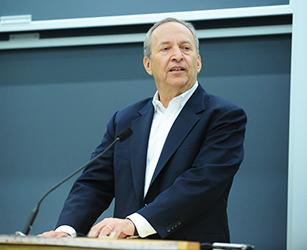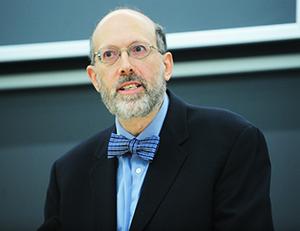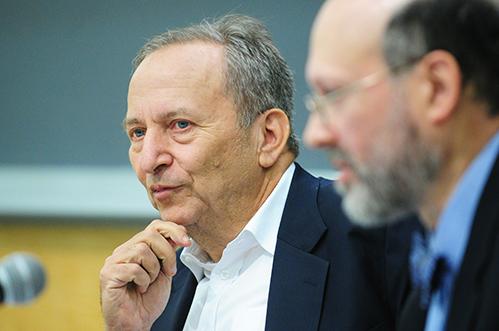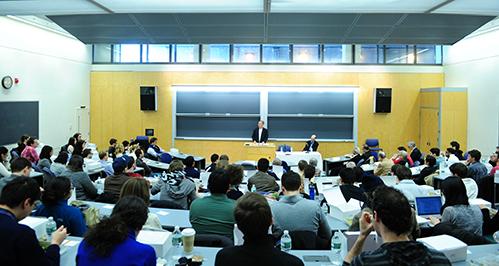Lawrence H. Summers, Former Secretary of the Treasury, Lectures on Academic Freedom
At Center on Law and Liberty's Inaugural Event, Summers Criticizes Boycott, Divestment, and Sanctions Movements Against Israel
New York, February 12, 2015—Academic freedom is essential to university life but does not include freedom from criticism, former U.S. Secretary of the Treasury Lawrence H. Summers told members of the Columbia University community in a Jan. 29 lecture at Jerome Greene Hall.
| Lawrence H. Summers, former U.S. Secretary of the Treasury and President Emeritus of Harvard University, delivers a lecture on academic freedom and anti-Semitism at Columbia Law School. |
The presentation served as the inaugural event for the Law School’s Center on Law and Liberty, which studies freedom, threats to its existence, and legal protections designed to ensure its survival. The center is directed by Columbia Law School Professor Philip Hamburger, an expert on constitutional law, religious liberty, the history of law, and contracts. Hamburger is also the author of Is Administrative Law Unlawful? (2014), Law and Judicial Duty (2008), and Separation of Church and State (2002).
Summers focused on anti-Semitism in his remarks about academic freedom, drawing from his own experience at Harvard in 2002 when he came out against a movement to have the university divest from Israel because of its settlement policies.
At the time, Summers said initiatives and statements advocating divestment from Israel were “anti-Semitic in their effect if not their intent” and that they resulted from the application of a double standard to Israel. Although many Jewish students said they were offended by the campaign, Summers did not put a stop to the actions of its proponents. Nevertheless, the university made no changes to its endowment.
“There was the aspect of making clear the university was not engaged in singling out any country,” Summers said during his lecture, which was sponsored by the Mailman Foundation. “And I believed that speaking out against actions that crossed a line with respect to anti-Semitism was salutary as well.”
| The Law School's Center on Law and Liberty, which Professor Philip Hamburger directs, hosted Summers for its inaugural event. |
Looking back, Summers said reasonable people could disagree with his decision to oppose the divestment movement. But he said he is confident that he upheld academic freedom and the ability of anyone to petition without “fear of retribution” while still expressing his views.
Summers explained his reasoning with an analogy.
“Does anyone doubt that if African countries were singled out for sanction when non-African countries guilty of the same vice were not that racism would be alleged?” he asked. “And rightly so.”
He pointed out that, at the time of the divestment movement at Harvard, policies that were similar to or worse than Israel’s were in place in many other countries—and still are today in some cases.
“The proponents of Israeli boycotts, divestiture, and sanctions do not favor any form of pressure against countries other than Israel,” he said.
Summers said discussions about academic freedom and anti-Semitism are even more relevant today. Although he said he is against censorship of any kind—including civility pledges, speech codes, and disinviting or limiting invitations to guests with unpopular views, Summers said he would have taken a much stronger stand against the American Studies Association’s 2013 decision to implement an academic boycott of Israel, part of the Boycott, Divestment, and Sanctions (BDS) movement.
| After the lecture, Hamburger moderated a Q&A session with Summers. |
He said he would have called the decision “abhorrent” and withdrawn his university’s membership from the organization.
“Such statements would bring moral clarity where it is currently missing,” Summers said. “The problem is that the American academic community is being implicated in uniquely persecuting the world’s only Jewish State for sins that even on the least sympathetic reading are small compared to those of many other nations.”
Summers said universities’ decisions not to speak out against the ASA’s actions “represent a real threat.”
“Academic freedom is essential if universities are to succeed in their missions of creating and disseminating knowledge,” Summers said.
After the lecture, Summers responded to questions from audience members and Hamburger.
Summers is the Charles W. Eliot University Professor and President Emeritus of Harvard University. His lecture was the first in a series of events to be held by the Center on Law and Liberty.
| Students and faculty packed the lecture hall for the event. |



